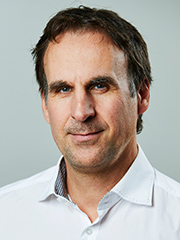Prof. Dr. Marcus Brüggen

Photo: Carsten Dammann
Principal Investigator
Address
University of Hamburg
Faculty of Mathematics, Informatics and Natural Sciences
Hamburg Observatory
Gojenbergsweg 112
21029 Hamburg
Contact
Tel: +49 40 42838-8537
ORCID: 0000-0002-3369-7735
Academic career
- Since 2012: Professor (W3) for Extragalactic Astrophysics/Observational Cosmology, Universität Hamburg, Germany
- 2006–2012: Associate Professor of Astrophysics, Jacobs University Bremen, Germany
- 2001–2006: Assistant Professor of Astrophysics, Jacobs University Bremen, Germany
- 1999–2000: Postdoctoral Researcher, Max-Planck Institute for Astrophysics, Garching, Germany
- 1999: Doctorate in Astrophysics, University of Cambridge, UK, supervisor: Douglas Owen Gough
- Degree in Natural Sciences, University of Cambridge, UK
Institutional responsibilities
- Since 2022: Member of the Scientific Advisory Council of the Leibniz-Institut für Astrophysik Potsdam (AIP)
- Since 2022: Member of the eROSITA (space mission) Steering Committee
- Since 2021: Panel Chair Astrophysics for the Leibniz-Rechenzentrum (LRZ), Munich
- Since 2020: Chair of Advisory Board of Thuringian State Observatory
- Since 2020: Nomination panel for the Hamburg Prize for Theoretical Physics
- Since 2019: Member of the Steering Committee (area coordinator Gravitational Waves) of the Cluster of Excellence “Quantum Universe”, Universität Hamburg, Germany
- 2017: Scientific Advisory Board, University of Cologne, Germany
- Since 2016: Chairman Graduate Fellowship Programme, Universität Hamburg, Germany
- Since 2016: Executive Committee Council of German Observatories (Rat Deutscher Sternwarten)
- 2016–2020: Chairman, German Long Wavelength Consortium (GLOW)
- 2016–2020: Member of DFG Grants Committee Astronomy (Fachkollegium Astronomie)
- Since 2015: Executive Board 4MOST instrument consortium
- Since 2014: Vice-director Hamburg Observatory, Universität Hamburg, Germany
- 2010–2016: German representative on Executive Board International LOFAR Telescope
- Since 2010: Core Team of LOFAR Surveys Key Science Project
